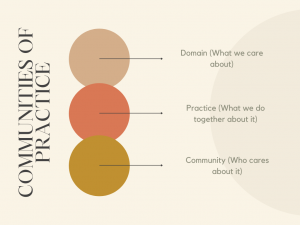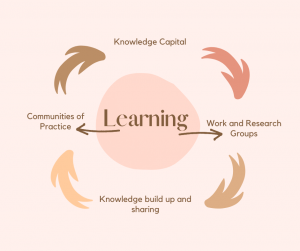Communities of Practice (CoPs) are organized groups of people who have a common interest in a specific technical or educational domain. They regularly collaborate to share information, improve their skills, and actively work on advancing the general knowledge of the domain. Healthy CoPs have a culture built on professional networking, personal relationships, shared knowledge, and conversational skills. Combined with voluntary participation, CoPs provide knowledge workers with opportunities to experience autonomy, mastery, and purpose beyond their daily tasks.
CoPs enable practitioners to exchange knowledge and skills with people across the entire organization. This open membership offers access to a wide range of expertise to help with technical challenges and fuel continuous improvement. In addition, it allows for more meaningful contributions to the larger goals. The result is that organizations benefit from rapid problem-solving, improved quality, cooperation across multiple domains, and increased retention of top talent.
According to Wenger, CoPs must have three distinct traits to be considered a community of practice, as illustrated below:
- Domain – An area of shared interest.
- Practice – A shared body of knowledge, experiences, and techniques. Community – A self-selected group of individuals who care enough about the topic to participate in regular interactions

For Etienne Wenger, learning is central to human identity. A primary focus is learning as social participation. Individuals are active participants in social communities of practices and construct their identity through these communities. People continuously create their shared identity through engaging in and contributing to the practices of their communities.

The motivation to become a more central participant in a community of practice can provide a powerful incentive for learning. In addition, students will desire to develop skills (e.g. literacy skills) if the people they admire have the same abilities. Communities of Practice can play an instrumental role in transforming learning practices from individual institutions to networked learning communities. The successful collaboration focuses on deepening knowledge, applying innovative solutions, and providing access to resources and peer-to-peer mentoring. Higher education institutions play an essential role in modelling this behaviour by creating multi-national research, and teaching teams focused on innovation and problem-solving.
The professional learning needs of educators are changing. Communities of practice offer a robust strategy for professional learning. Here is why:
- Complex problems require more implicit knowledge, which cannot be codified.
- Implicit knowledge can only be shared through conversations and observation.
- Collaborative and distributed work is becoming the norm.
Knowledge sharing and narration of work make implicit knowledge more visible.
- New ideas come from diverse networks, often from outside the organization.
- Learning is part of work, not separate from it. Communities of practice enable the integration of work and learning.
Communities of practice do not usually require heavy institutional infrastructures, but their members need time and space to collaborate. These communities do not require much management, but they can use leadership. They self-organize, but they flourish when their learning fits with their organizational environment.
The art is to help such communities find resources and connections without overwhelming them with organizational meddling. This need for balance reflects the following paradox: No community can fully design the learning of another; but conversely, no community can entirely create its learning.
References:
Wenger, Etienne. Communities of Practice: Learning, Meaning, and Identity. Cambridge University Press, 1999.
Pink, Daniel H. Drive: The Surprising Truth About What Motivates Us. Riverhead Books, 2009.